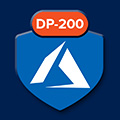
Duration: 3 Days
Module 1: Azure for the Data Engineer
This module explores how the world of data has evolved and how Cloud data platform technologies are providing new opportunities for business to explore their data in different ways. The student will gain an overview of the various data platform technologies that are available, and how a Data Engineers role and responsibilities has evolved to work in this new world to an organization benefit
Lessons:
Hands-On: Azure for the Data Engineer
Module 2: Working with Data Storage
This module teaches the variety of ways to store data in Azure. The Student will learn the basics of storage management in Azure, how to create a Storage Account, and how to choose the right model for the data you want to store in the cloud. They will also understand how data lake storage can be created to support a wide variety of big data analytics solutions with minimal effort.
Lessons:
Hands-On: Working with Data Storage
Module 3: Enabling Team-Based Data Science with Azure Databricks
This module introduces students to Azure Databricks and how a Data Engineer works with it to enable an organization to perform Team Data Science projects. They will learn the fundamentals of Azure Databricks and Apache Spark notebooks; how to provision the service and workspaces and learn how to perform data preparation task that can contribute to the data science project.
Lessons:
Hands-On: Enabling Team-Based Data Science with Azure Databricks
Module 4: Building Globally Distributed Databases with Cosmos DB
In this module, students will learn how to work with NoSQL data using Azure Cosmos DB. They will learn how to provision the service, and how they can load and interrogate data in the service using Visual Studio Code extensions, and the Azure Cosmos DB .NET Core SDK. They will also learn how to configure the availability options so that users are able to access the data from anywhere in the world.
Lessons:
Hands-On: Building Globally Distributed Databases with Cosmos DB
Module 5: Working with Relational Data Stores in the Cloud
In this module, students will explore the Azure relational data platform options including SQL Database and SQL Data Warehouse. The student will be able explain why they would choose one service over another, and how to provision, connect and manage each of the services.
Lessons:
Hands-On: Working with Relational Data Stores in the Cloud
Module 6: Performing Real-Time Analytics with Stream Analytics
In this module, students will learn the concepts of event processing and streaming data and how this applies to Events Hubs and Azure Stream Analytics. The students will then set up a stream analytics job to stream data and learn how to query the incoming data to perform analysis of the data. Finally, you will learn how to manage and monitor running jobs.
Lessons:
Hands-On: Performing Real-Time Analytics with Stream Analytics
Module 7: Orchestrating Data Movement with Azure Data Factory
In this module, students will learn how Azure Data factory can be used to orchestrate the data movement and transformation from a wide range of data platform technologies. They will be able to explain the capabilities of the technology and be able to set up an end to end data pipeline that ingests and transforms data.
Lessons:
Hands-On: Orchestrating Data Movement with Azure Data Factory
Module 8: Securing Azure Data Platforms
In this module, students will learn how Azure provides a multi-layered security model to protect your data. The students will explore how security can range from setting up secure networks and access keys, to defining permission through to monitoring across a range of data stores.
Lessons:
Hands-On: Securing Azure Data Platforms
Module 9: Monitoring and Troubleshooting Data Storage and Processing
In this module, the student will get an overview of the range of monitoring capabilities that are available to provide operational support should there be issue with a data platform architecture. They will explore the common data storage and data processing issues. Finally, disaster recovery options are revealed to ensure business continuity.
Lessons:
Hands-On: Monitoring and Troubleshooting Data Storage and Processing
A Certified Microsoft Azure Trainer
£1599+VAT
Clientele ➞























Our Partners




